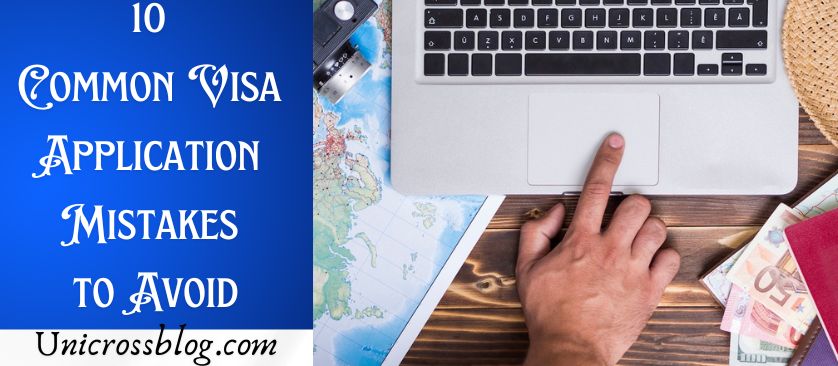As you embark on your journey to secure a visa, you’re likely filled with excitement and anticipation. However, the application process can be fraught with potential pitfalls that could derail your plans.
To ensure a smooth experience, it’s crucial to be aware of common mistakes that applicants often make. By avoiding these errors, you’ll significantly increase your chances of a successful outcome.
In this article, we’ll explore ten frequent visa application mistakes and provide you with valuable insights on how to sidestep them. Armed with this knowledge, you’ll be well-prepared to navigate the visa application process with confidence and precision.

10 Common Visa Application Mistakes to Avoid
When applying for a visa, attention to detail is crucial. Even minor oversights can lead to delays or rejections. Here are ten common mistakes you should avoid to ensure a smooth visa application process:
1. Incomplete or Inaccurate Information
One of the most frequent errors is submitting incomplete or inaccurate information. Double-check every field on your application form before submission. Ensure all names, dates, and passport numbers are correct and match your supporting documents. Even a small typo can cause significant delays or result in a rejection.
2. Insufficient Supporting Documentation
Another common pitfall is failing to provide all required supporting documents. Different visa types often require specific paperwork, such as:
- Proof of financial means
- Travel itinerary
- Accommodation details
- Employment verification
Always carefully review the visa requirements and include all necessary documentation. It’s better to provide more information than not enough.
3. Submitting Poor Quality Photos
Visa photos are a crucial component of your application. Many applicants submit photos that don’t meet the specified requirements. Ensure your photo:
- Is recent (usually taken within the last 6 months)
- Has the correct dimensions
- Shows a clear, front-facing view of your face
- Has a plain, light-colored background
Using a professional photo service can help you avoid this common mistake.
4. Applying Too Late
Waiting until the last minute to apply for your visa is a risky move. Processing times can vary greatly, and unexpected delays can occur. As a general rule, apply for your visa at least 3-4 months before your intended travel date. This buffer allows time for any additional requests or unforeseen circumstances.
5. Overlooking Entry and Exit Requirements
Many travelers focus solely on obtaining a visa and forget about entry and exit requirements. Some countries require:
- A minimum passport validity period beyond your intended stay
- Blank pages in your passport for entry stamps
- Proof of onward travel
Familiarize yourself with these requirements to avoid being denied entry at your destination.
6. Inconsistent Information Across Documents
Make sure that all information in your application and supporting documents is consistent. Any discrepancies in dates, names, or other details can alert reviewers and may result in delays or rejections. If there are valid reasons for any inconsistencies, be sure to provide a clear explanation in your application.
7. Neglecting to Translate Documents
If your supporting documents are not in the official language of the country you’re applying to, you’ll need to provide certified translations. Failing to do so can result in your application being deemed incomplete. Always use professional translation services to ensure accuracy.
8. Providing False Information
It might be tempting to embellish your application to increase your chances of approval, but this is a serious mistake. Providing false information on your visa application is not only unethical but can also result in long-term consequences, including being banned from entering the country in the future.
9. Ignoring Visa Conditions and Restrictions
Once you receive your visa, carefully review the conditions and restrictions. Common mistakes include:
- Overstaying the visa’s validity period
- Engaging in activities not permitted by your visa type (e.g., working on a tourist visa)
- Failing to report changes in circumstances to the relevant authorities
Understanding and adhering to your visa conditions is crucial to maintain your legal status and avoid future complications.
10. Not Seeking Professional Help When Needed
While many visa applications are straightforward, complex cases may benefit from professional assistance. If you’re unsure about any aspect of your application or have a unique situation, consider consulting with a reputable immigration lawyer or visa specialist. Their expertise can help you navigate the process more smoothly and increase your chances of a successful application.
By avoiding these common mistakes, you’ll significantly improve your chances of a successful visa application. Remember, thorough preparation and attention to detail are key to ensuring your travel plans proceed without unnecessary complications.
READ ALSO: Top 10 Countries with Easy Visa Policies
FAQs
What are the most common reasons for visa application rejections?
Visa applications can be rejected for various reasons, but some of the most common include incomplete documentation, insufficient funds, criminal history, and providing false information. Incomplete or inaccurate applications are a frequent cause of rejection, as consular officers need to have a clear understanding of your travel plans and background. Demonstrating inadequate financial resources to support your stay is another major issue, as countries want to ensure visitors can cover their expenses without resorting to unauthorized work.
Criminal records, even for minor offenses, can significantly impact your eligibility. It’s crucial to disclose any criminal history honestly, as attempting to conceal such information can lead to immediate rejection and potential long-term consequences. Providing false or misleading information, whether intentionally or not, is a serious offense that can result in visa denial and future travel restrictions.
How long does the visa application process typically take?
The duration of the visa application process can vary significantly depending on the country you’re applying to, the type of visa, and current processing times. Generally, it can take anywhere from a few days to several months. For example, tourist visas for some countries may be processed within a week, while work or student visas often require several weeks or even months.
It’s important to note that processing times can fluctuate based on factors such as application volume, staffing levels at embassies or consulates, and geopolitical events. To avoid potential delays, it’s advisable to:
- Start the application process well in advance of your intended travel date
- Check the official website of the embassy or consulate for current processing times
- Consider expedited processing options, if available and necessary
Can I appeal a visa rejection?
In most cases, you can appeal a visa rejection, but the process and likelihood of success vary depending on the country and the specific reasons for denial. Some countries offer a formal appeals process, while others may require you to submit a new application addressing the issues that led to the initial rejection.
Before deciding to appeal, carefully review the rejection letter to understand the specific reasons for the denial. If you believe there was a misunderstanding or you can provide additional evidence to support your case, an appeal might be worthwhile. However, if the rejection was due to a fundamental issue such as ineligibility or a serious violation, it may be more productive to explore alternative options or wait before reapplying.
When considering an appeal:
- Gather all relevant documentation and new evidence to support your case
- Seek legal advice from an immigration attorney if the situation is complex
- Be prepared for potential additional fees and a potentially lengthy process
Are there any resources available to help with visa applications?
Yes, there are numerous resources available to assist you with your visa application:
- Official government websites: These provide the most up-to-date and accurate information on visa requirements, processes, and forms.
- Embassy or consulate services: Many diplomatic missions offer guidance and support for visa applicants.
- Visa application centers: Some countries outsource their visa processing to specialized centers that can provide assistance and answer questions.
- Immigration lawyers: For complex cases or if you need personalized advice, consulting with an immigration attorney can be beneficial.
- Online forums and communities: While not official sources, these can provide insights from others who have gone through the process. However, always verify information from official sources.
- Travel agencies: Some agencies offer visa application services, which can be helpful if you’re unfamiliar with the process.
Remember, while these resources can be valuable, ultimately, you are responsible for the accuracy and completeness of your application. Always double-check information and ensure you’re using the most current forms and following the latest guidelines.







